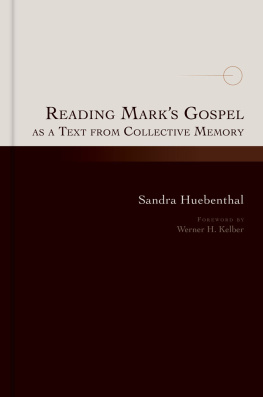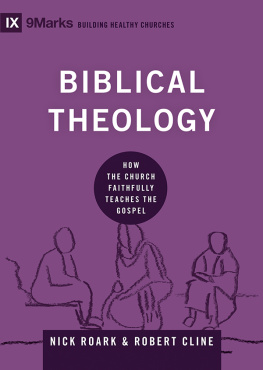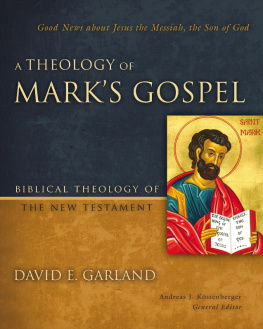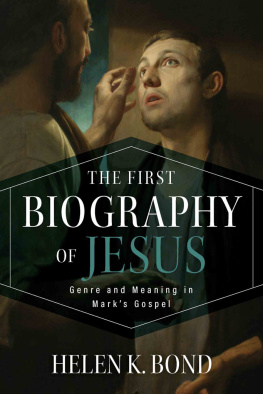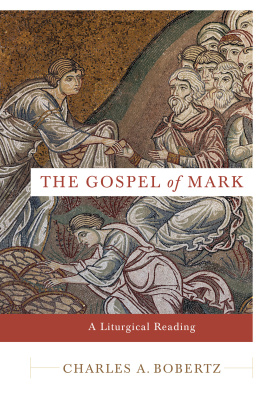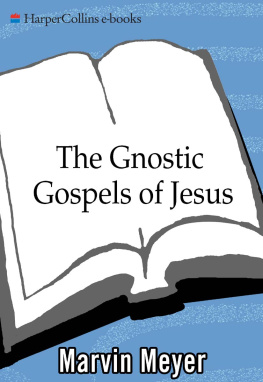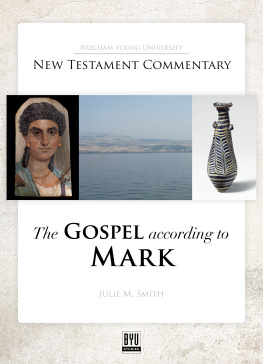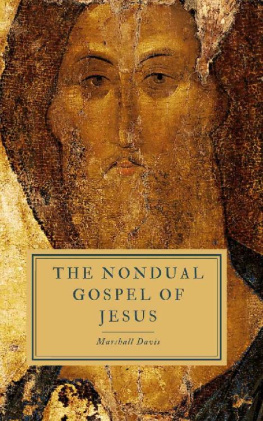Reading Marks Gospel
as a Text from Collective Memory
Sandra Huebenthal
WILLIAM B. EERDMANS PUBLISHING COMPANY
GRAND RAPIDS, MIchigan
Wm. B. Eerdmans Publishing Co.
4035 Park East Court SE, Grand Rapids, Michigan 49546
www.eerdmans.com
2020 Sandra Huebenthal
All rights reserved
Published 2020
262524232221201234567
ISBN 978-0-8028-7540-2
eISBN 978-1-4674-5846-7
Library of Congress Cataloging-in-Publication Data
Names: Huebenthal, Sandra, 1975 author.
Title: Reading Marks gospel as a text from collective memory / Sandra Huebenthal.
Description: Grand Rapids, Michigan : William B. Eerdmans Publishing Company, 2020. | Includes bibliographical references and index. | Summary: Demonstrates that Marks gospel is a text evolving from collective narrative memory based on recollections of Jesuss life and teachings. The author investigates what the community remembers and how this memory is structured and presented, examining which image of Jesus, as well as which self-image, this memory text designsProvided by publisher.
Identifiers: LCCN 2019047901 | ISBN 9780802875402 (hardcover)
Subjects: LCSH: Bible. MarkCriticism, interpretation, etc. | MemoryReligious aspectsChristianity.
Classification: LCC BS2585.52 .H834 2020 | DDC 226.3/06dc23
LC record available at https://lccn.loc.gov/2019047901
Contents
1.Exegetical Kaleidoscope:
Images of the Genesis and Interpretation of Marks Gospel
2.Social Recollection:
The Construction of Memory Texts in Collective Memories
The past is never dead. Its not even past.
WILLIAM FAULKNER, Requiem for a Nun, act 1, scene 3
Reflecting on the state of memory research, Sandra Huebenthal has observed that in the last twenty years, a flood of publications about social recollection and memory have appeared, not only in both the humanities and the social sciences, but also in the natural sciences (page 142). In these areas, memory discourse has become a recurring theme, and it almost seems as if memory is about to rise to paradigmatic significance. But as Huebenthal points out, this is a recent development that has found little response in studies of the Bible. In post-Enlightenment history, the category of memory was of little account in the interpretation of the Bible, has often played no role at all, or was a topos held in disdain. Huebenthal is therefore also correct in pointing out that memory-theoretic approaches have up to now not gained currency in Markan scholarship (page 4). In point of fact, the historical and literary interpretation of the Gospel of Mark, and of the Gospels generally, has taken almost no notice of collective memory, the principal topic of this volume. For this reason alone the authors launching of the memorial phenomenon in gospel studies merits our attention. No less noteworthy is the uncommon interest Huebenthal is devoting to the oral medium. In this case, she is rehabilitating an aspect that the typographically mediated discipline has either textually misconstrued or given the silent treatment. Media and media shifts from oral to scribal, she insists, have to be taken seriously, and the latter are poorly understood as an inconsequential, smooth transition from one to the other (pages 3536). What therefore bestows a special quality on this book is the extensive and nuanced elaboration of the two closely related themes that were abandoned or misunderstood in the modern study of the Bible, despite their having been
A third feature worth noting concerns the authors deliberate consideration of the narrative structure of the gospel. While narrative criticism has for some time now been absorbed into the interpretation of the gospels, the modern scholarship of the New Testament has for the longest part of its history been unable to acknowledge, let alone appreciate, the significance of the narrative craft of the gospels. Both the logic and the aesthetic of narrative poetics have remained inaccessible to the disciplines historical, theological, and exegetical approaches. Strange as it may seem today, it has taken the modern study of the gospels until the late 1970s The result is an uncommon alliance between intratextual causalities and intertextual referentiality.
It is further noteworthy that Huebenthals approach is guided by the so-called cultural turn. As a consequence of its cultural orientation, her writing by and large abstains from conventional theological language (Christology, eschatology, etc.). The designation of culture is here understood, not in the elitist sense of featuring the highly refined specimens of music, architecture, literature, and the arts, but in a vastly expanded and democratized sense of connoting the social formation of actuality. It is precisely the constructivist theme, the notion that reality is closely bound up with social contexts and conditioned by social forces, that forms a central premise of this book. Tradition and the past, identity and narrative, for example, the constructivist premise suggests, are accessible to us not as immediately lived experiences but as they exist and are attainable only in their constructed mediation. Foremost among the phenomena that are subject to constructivist forces is Mnemosyne herself. Insofar as construction appears to be a basic characteristic of recollection and mnemonic processes (page 122), memory and her constructive activities constitute the central thesis of Huebenthals book. The re-presentation of the pastwhich is the main objective of memoryis created in accordance with the needs of the present (page 147). Hence, the work of memory is to be understood not as a reiteration but rather as a reconstruction of the past. At this point, the author links up the memory discourse with the cognitive, neurological sciences. Very much in accord with the operations of the human brain that are regulated by selective, productive mechanisms, memory is likewise driven by constructive dynamics, functioning selectively in relation to present realities. Thus, the basic functions of memory match the processes of brain work. In a move rarely, if ever, encountered in New Testament studies, allowance is being made for the coexistence of both the social and the cognitive processes of memory.
To adequately assess the books specific focus on collective memory, it is appropriate to raise awareness both of the centrality of memory in antiquity and the Middle Ages and of her decline in modernity and the historical-critical additionally develops the constructive, deliberative force of memory, which exercises powers to break up and form new images, to rearrange interior data, and to compose new ones. Notwithstanding a growing chirographic dominance, ancient and medieval history represented a memorial culture, to the same degree that the last five hundred years of Western intellectual history can be defined as a textual, typographic culture. But the important thing to realize is that all along, the status of memory, including all memorial theories and practices, was subject to continuing changes, chief among them memorys dissociation from her rhetorical, oral base and her reassignment to dialectic, ethics, and the metaphysics of knowing.
As far as the diminution and demise of memory is concerned, it was under the impact of Renaissance humanism and Ramism,typographic medium appeared to demonstrate ever more conclusively that oral faculties and memorial senses were forfeiting their importance and rapidly becoming obsolete. In other words, under the impact of the new, artificial means of producing books (ars artificialiter scribendi), the very senses that had played an eminently retentive and constructive role in ancient and medieval communications culture were slowly but surely losing their raison dtre. It was the

